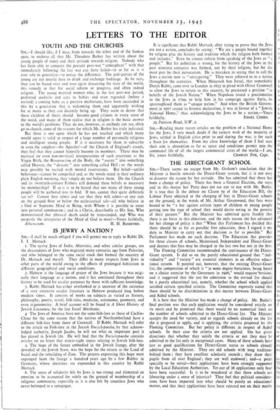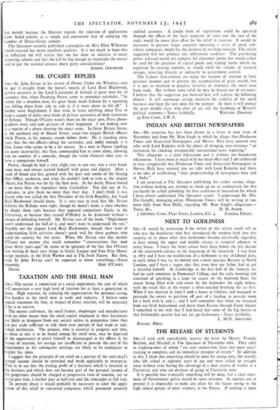THE DIRECT-GRANT SCHOOL
SIR,—There seems no escape from Mr. Graham's conclusion that the Minister is hostile towards the Direct-Grant system, but it is not easy to discover the reason for her attitude. She has admitted that there has been a change of policy. There has been a General Election, she says, and in this matter her Party does not see eye to eye with Mr. Butler. It is true that in the debate on Clause 59 of the Education Bill, the Labour Party objected to the charging of fees in Direct-Grant schools on the ground, in the words of Mr. Arthur Greenwood, that fees were bound to be " a bar against certain types of children or young people getting into the type of school they would desire owing to the poverty of their parents." But the Minister has admitted quite frankly that there is no force in this objection, and the only reason she has advanced for her change of policy is that "When this Parliament has decided that there should be as far as possible free education, then I regard it my duty as Minister to carry out that decision as far as possible." But Parliament has made no such decision. The Education Act provides for three classes of schools, Maintained, Independent and Direct-Grant and decrees that fees may be charged in the last two but not in the first.
The Fleming Committee recommended the continuance of the Direct- Grant system. It did so on the purely educational ground that " indi- viduality " and " variety " are essential elements in an effective educa- tional system. It pointed out, however, that the existing Direct-Grant list, the composition of which is " in some degree fortuitous, being based on a choice exercise by the Governors in 1926," would requirelevision, and it suggested that the test for admission to the revised list should be a purely educational test, namely, whether the school which applied Si satisfied certain specified criteria. The Committee expressly stated that wi there should be no discrimination in this matter between Direct-Grant ml and Aided schools. hii It is here that the Minister has made a change of policy. Mr. Butler's sp final position was that each application would be considered strictly on if its merit and he promised that there would be no numerical limit on the number of schools admitted to the Direct-Grant list. The Minister wi accepts the need for variety, and as regards schools already on the list an she is prepared to apply, and is applying, the criteria proposed by the cal Fleming Committee. But her policy is different in respect of Aided vii schools. In their case the criteria are not applied. She has given as directions that whether they satisfy the criteria or not they may be adMitted to the list only in exceptional cases. Many of these schools have just as good qualifications for Direct-Grant status as schools already admitted by the Minister. They are old schools with long traditions behind them ; they have excellent scholastic records ; they draw their pupils from all over England ; they are well endowed ; and—a point ea] specially to be noted—their applications have been strongly supported Ti by the Local Education Authorities. Yet out of 36 applications only four the have been successful. Is it to be wondered at that these schools are thi labouring under a sense of injustice? They feel that political considera- tions have been imported into what should be purely an educational matter, and that their applications have been rejected not on their merits cat but merely because the Minister regards the rejection of applications from Aided schools as a simple and convenient way of reducing the number of Direct-Grant schools.
The Spectator recently published a panegyric on Miss Ellen Wilkinson which stressed her many excellent qualities. Is it too much to hope that on reflection she will realise that she has done an injustice to many deserving schools and that she will be big enough to reconsider the matter and to put the national interest above party considerations?
SCHOOL GOVERNOR.



























 Previous page
Previous page